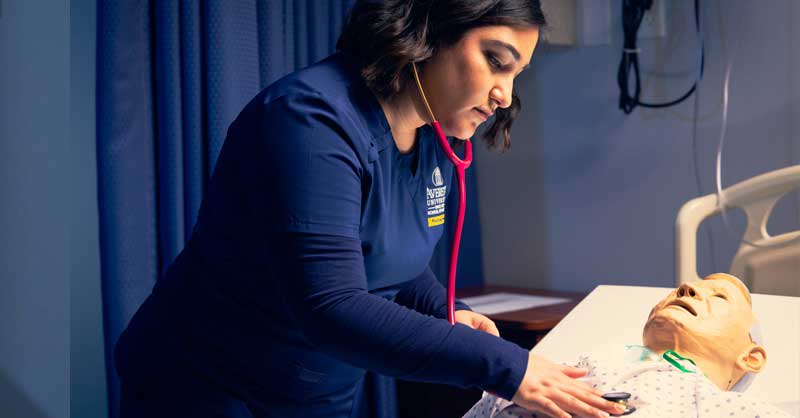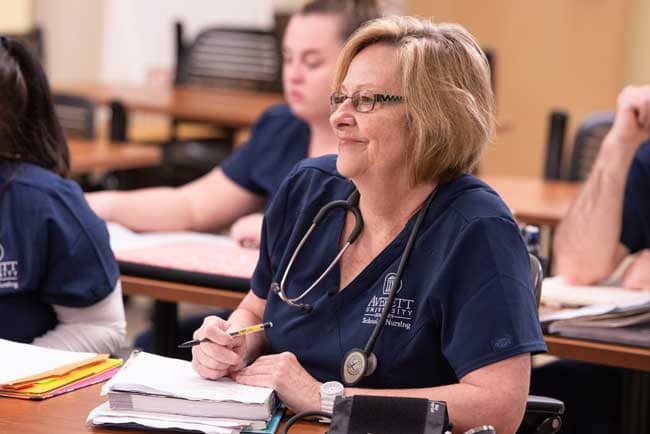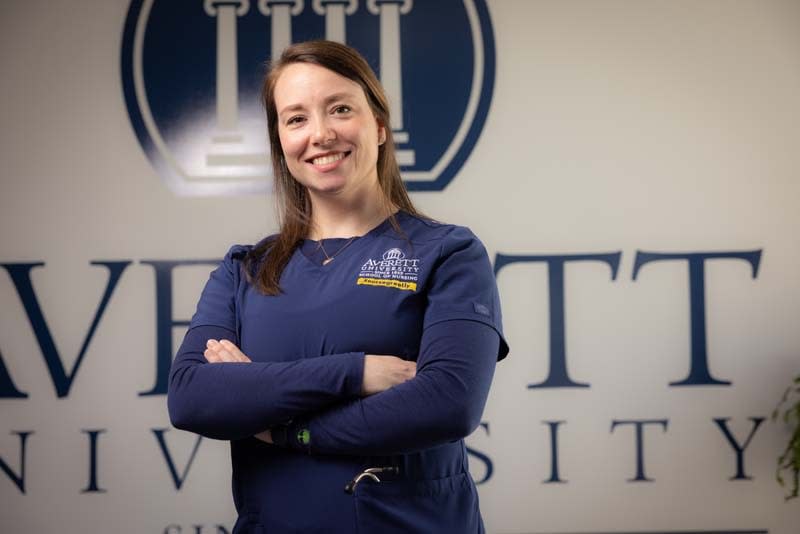Accelerated BSN vs. Traditional BSN
Each blog post is dated and contains accurate information as of that date. Certain information may have changed since the blog post publication date. If you would like to confirm the current accuracy of blog information, please visit our ABSN overview page or contact admissions at (866) 483-8705.
The main difference between an accelerated BSN vs. traditional BSN is timing. With an accelerated BSN, you finish in as few as 16 months, whereas traditional BSN programs take four years. If you have a prior non-nursing bachelor's degree or 60 college credits, consider an accelerated BSN program.

If you’re interested in becoming a nurse, you’ve probably noticed that there are various ways you can earn your Bachelor of Science in Nursing (BSN) degree. The two primary options available are the accelerated BSN and traditional BSN. How do you differentiate between the accelerated BSN vs. traditional BSN and decide which is best for you? We’ll walk through these two pathways to provide clarity on how to move forward with your nursing journey.
At Averett University in Norfolk, Virginia, we’re well-versed in helping students decide which route is right for them. If you qualify for the Accelerated Bachelor of Science in Nursing (ABSN) program at Averett, it’s worth considering if you’re looking to earn a BSN in as few as 16 months rather than in the traditional four-year timeline.
Before we compare traditional BSN vs. accelerated BSN, let’s review the importance of choosing a BSN program.
Why a BSN?
While it’s possible to become an RN with an Associate Degree in Nursing (ADN), a BSN degree has become the preferred standard for RNs in the U.S. In 2021, an American Association of Colleges of Nursing (AACN) survey of health care employers found that more than 40.6 percent of hospitals and health care facilities require RN applicants to hold a BSN. Additionally, the survey showed that nationwide, more than 77 percent of employers strongly prefer to hire BSN-prepared nurses.
Rather than focusing solely on skills-based education, a BSN requires an understanding of health policy, system improvement, research, evidence-based practice, teamwork, decision-making and leadership. Thus, BSN-educated nurses are better prepared for career growth and pursuit of advanced practice nursing. Not to mention, several studies have shown that having a higher percentage of BSN-educated nurses on staff leads to better patient outcomes, including lower readmission and mortality rates.

Learn more about why a BSN in nursing is important.
Traditional BSN Program Features
If you’re a high school graduate with no prior college experience or a transfer student with a few non-nursing college credits, a traditional BSN program (sometimes called a ground-based program) is probably your best option.
Traditional programs, such as the one at Averett University, offer one fall start date per year. These programs usually require four years of full-time study that consist of general education courses in addition to nursing fundamentals and theory courses, hands-on nursing skills practice and diverse clinical rotations.
Ground-based programs may have general education requirements, but you can typically fulfill these within your four years of study. Traditional BSN programs do not generally have prerequisites that are needed before you can enroll.

In summary, the main factors to consider with traditional BSN programs include:
- Four-year time frame
- One start date generally available per year
- Curriculum: general education courses + nursing-focused courses
- Classes generally take place in person on campus
- No prior college experience or prerequisites required
- Ideal for students with no or little prior college experience
Accelerated BSN Program Features
Accelerated BSN programs allow you to build on your previous college experience, so you don’t have to start your undergraduate education from square one. If you hold a non-nursing bachelor’s degree or at least 60 prior non-nursing college credits, an Accelerated BSN (ABSN) program might be a better option for you. Typically, you can complete an accelerated program much more quickly than a traditional program.
How hard is an accelerated BSN program? Learn what to expect in an ABSN program.

Most ABSN programs, including ours at Averett, require several prerequisite courses in order to be eligible for admission. These courses provide a base knowledge and ensure you’re prepared to jump into the nursing curriculum. Bear in mind, if you have a prior science degree, you may have already completed many of the prerequisites, so this will make it possible to start the BSN program sooner.
The ABSN program at Averett has a 16-month curriculum, a more condensed time frame than a traditional BSN program. Some accelerated programs, like the Averett ASBN, consist of a mix of online courses, skills and simulation labs and clinical rotations. Incorporating online classes helps streamline the learning process and allows greater independence in your studies.

How do online nursing classes work? See the benefits of incorporating online learning into the ABSN curriculum.
In summary, the main considerations with an accelerated BSN program include:
- One- to two-year time frame
- May offer multiple start dates per year
- Curriculum: nursing-focused courses
- Some programs incorporate online nursing courses into the curriculum
- At least 60 non-nursing college credits or a prior non-nursing bachelor’s degree generally required to be eligible
- Must complete prerequisite courses prior to enrollment
- Ideal for transfer students or those who already have a bachelor’s degree
Key Differences Between Accelerated BSN vs. Traditional BSN
As you’re deciding between ABSN vs. traditional BSN, here are the key differences to keep in mind. Depending on your educational history, one of these options may stand out as the clear choice.
| Accelerated BSN | Traditional BSN | |
| Degree attained | Bachelor of Science in Nursing | Bachelor of Science in Nursing |
| Time frame | One to two years | Four years |
| Start dates | May offer multiple per year | One per year |
| Curriculum | Only nursing-specific courses | General education courses + nursing specific courses |
| Eligibility | 60+ non-nursing college credits or prior non-nursing bachelor’s degree | High school diploma |
| Prerequisites | Required, specific courses depend on the program | Not required |
| Learning format | Combination of online or in-person courses, skills and simulation labs and clinical rotations | Combination of in-person courses, skills and simulation labs and clinical rotations |
Accelerated BSN at Averett
After evaluating accelerated vs. traditional nursing programs, if you’ve determined that an accelerated track is the right path for you, you should check out the ABSN program at Averett University in Norfolk, Virginia. The Accelerated BSN program at Averett allows you to leverage your previous non-nursing bachelor’s degree or 60+ hours of non-nursing college credits to earn a BSN in as few as 16 months.
Our ABSN program offers three start dates per year — in January, May and August — so you can begin your nursing education sooner. Students in the ABSN program gain a strong academic and experiential foundation through a combination of online coursework and required in-person skills and simulation labs and clinical rotations.
Considering exploring a new career in nursing? Learn how to become a nurse in eight steps.

Begin Your Accelerated Nursing Journey!
If you think an Accelerated BSN program might be the right track for you, let us know. Fill out our contact form today, and we’ll have an admissions counselor respond to you directly. They can answer any questions you might have and assist you throughout the application and enrollment processes.
